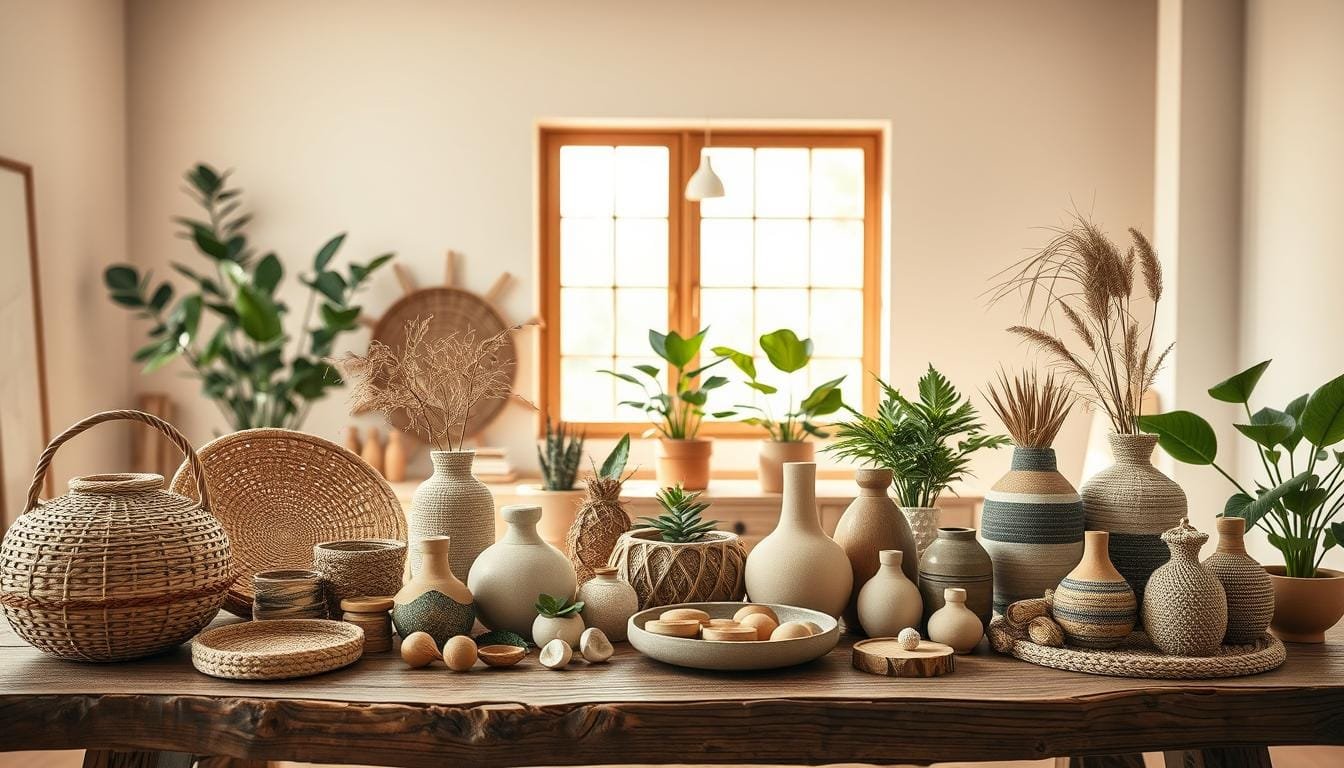Have you ever walked into a room and felt an instant sense of calm? That’s the magic of thoughtful design. A few years ago, I decided to revamp my living space. I wanted something that felt cozy yet fresh, and that’s when I discovered the beauty of sustainable home decor.
Choosing items made from natural materials like wood and organic cotton not only transformed my room but also made me feel good about my choices. It’s amazing how a single piece can elevate your space while supporting ethical practices.
In this article, we’ll explore how you can create a home that’s both stylish and kind to the environment. From fair trade products to brands like West Elm and The Citizenry, there are so many ways to make a positive impact. Let’s dive in and discover how small changes can lead to big results.
Understanding Sustainable Home Decor
Transforming your home into a sanctuary doesn’t have to come at the expense of the planet. By choosing sustainable home decor, you can create a space that’s both beautiful and environmentally responsible. Let’s explore what makes decor items eco-friendly and why they’re a smart choice for your home.
Defining Eco-Friendly Home Decor
Sustainable home decor focuses on using materials that are renewable, recyclable, and kind to the environment. Think of items like organic cotton curtains, reclaimed wood furniture, or bamboo accessories. These pieces not only look great but also reduce your carbon footprint.
Choosing materials like these means fewer harmful chemicals in your home. For example, low-VOC paints and natural fibers improve indoor air quality, making your living space healthier for you and your family.
Key Environmental and Health Benefits
When you opt for sustainable home decor, you’re making a positive impact on the environment. Materials like reclaimed wood reduce deforestation, while organic cotton avoids harmful pesticides. Here’s a quick look at the benefits:
| Material | Benefit |
|---|---|
| Reclaimed Wood | Reduces deforestation and waste |
| Organic Cotton | Pesticide-free and biodegradable |
| Bamboo | Fast-growing and renewable |
These choices also improve your health. Natural materials reduce exposure to toxins, creating a cleaner, safer environment. As one expert puts it,
“Your home should be a place that nurtures both you and the planet.”
By embracing sustainable home decor, you’re not just decorating—you’re making a statement. It’s a simple way to create a space that’s good for you and the world around you.
Exploring the Benefits of Eco-Conscious Living Spaces
Creating a home that feels good and does good is easier than you think. By making thoughtful choices, you can enjoy a space that’s both stylish and kind to the planet. Let’s dive into how small changes can lead to big benefits for your wallet, health, and the environment.
Energy Efficiency and Cost Savings
One of the easiest ways to make your home more eco-conscious is by focusing on energy efficiency. Switching to LED or solar-powered lighting can significantly reduce your energy bills. These options use less power and last longer than traditional bulbs.
Investing in energy-efficient appliances also pays off over time. They may cost more upfront, but the savings on your monthly bills add up. Plus, you’re reducing your carbon footprint, which is a win for the planet.
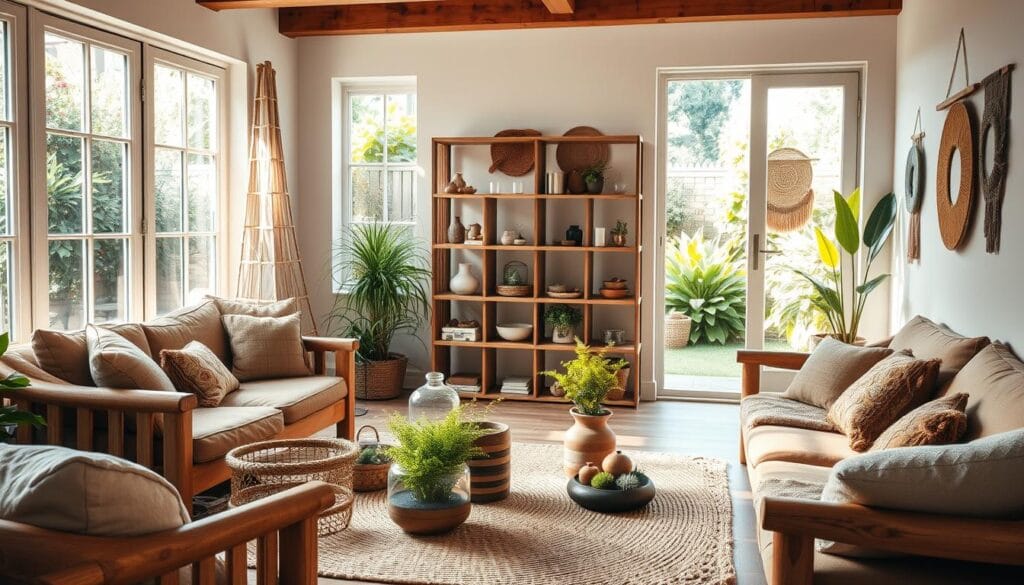
| Change | Benefit |
|---|---|
| LED Lighting | Uses 75% less energy, lasts 25x longer |
| Solar Panels | Reduces electricity bills, renewable energy source |
| Energy Star Appliances | Lower energy use, long-term savings |
Improved Indoor Air Quality and Wellbeing
Your home’s air quality plays a big role in your health. Many conventional materials release harmful chemicals, but natural options like organic cotton and reclaimed wood are safer. They don’t emit toxins, making your space healthier to live in.
Low-VOC paints are another great choice. They reduce indoor air pollutants by up to 50%, creating a fresher environment. Adding plants like snake plants or peace lilies can also purify the air naturally.
As one expert puts it,
“A healthy home starts with the materials you choose.”
By prioritizing natural, non-toxic options, you’re not just decorating—you’re creating a space that nurtures your wellbeing.
Eco-Friendly Elegance: Sustainable Handmade Decor Ideas
There’s something special about walking into a space that feels uniquely yours. Handcrafted home decor adds a personal touch that mass-produced items simply can’t match. Each piece tells a story, making your home a reflection of your style and values.
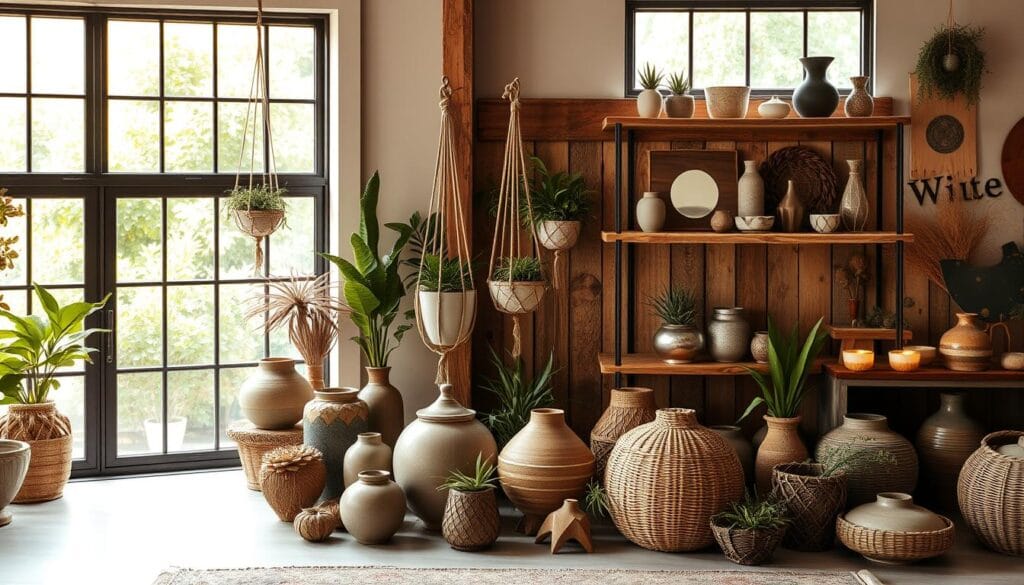
Unique Artisan Touch with Natural Materials
When you choose handmade items, you’re not just decorating—you’re investing in quality and craftsmanship. Brands like The Citizenry and West Elm emphasize the beauty of using natural materials like reclaimed wood and organic cotton. These materials bring warmth and texture to any room.
Handcrafted pieces often feature intricate details that showcase the skill of the artisan. Whether it’s a woven rug or a wooden table, each item is one-of-a-kind. This uniqueness adds character to your space, making it truly your own.
Long-Lasting, Biodegradable Decor Pieces
One of the best things about handmade home decor is its durability. Unlike factory-made products, these items are built to last. This reduces waste over time, making them a smart choice for your home and the environment.
Many handcrafted pieces are also biodegradable. Materials like organic cotton and bamboo break down naturally, unlike synthetic fibers that can harm the planet. Here’s a quick look at the benefits of using natural materials:
| Material | Benefit |
|---|---|
| Reclaimed Wood | Reduces deforestation, durable |
| Organic Cotton | Biodegradable, pesticide-free |
| Bamboo | Fast-growing, renewable |
By choosing handmade home decor, you’re supporting artisans and making a positive impact. It’s a way to create a beautiful space while staying true to your values.
Handcrafted Home Goods and Ethical Practices
When you choose handcrafted home goods, you’re supporting more than just beautiful design. These items are crafted with care, often using traditional techniques passed down through generations. By investing in these pieces, you’re helping to preserve cultural heritage and empower artisans worldwide.
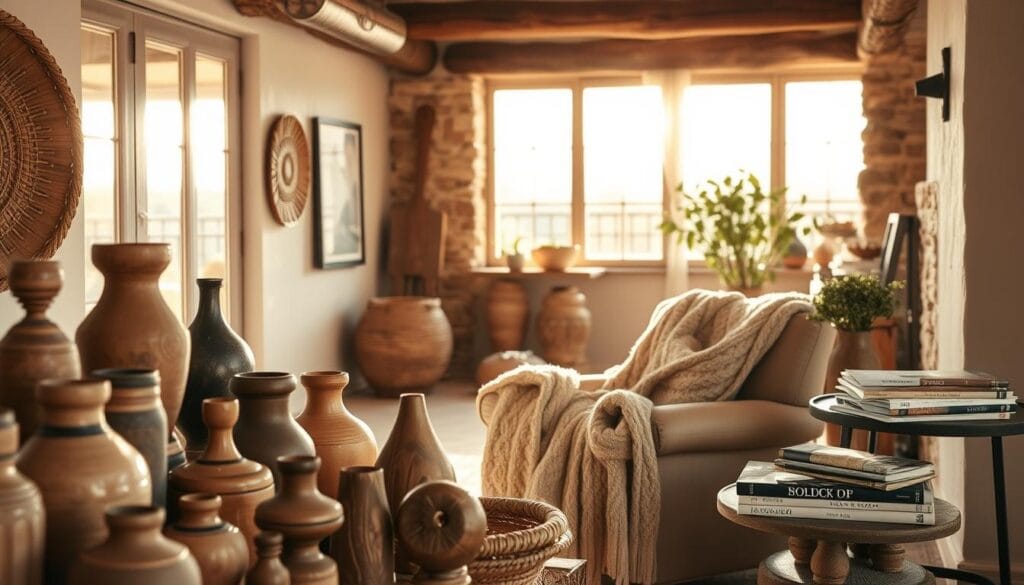
Celebrating Artisanal Craftsmanship
Artisanal craftsmanship brings a unique charm to every piece. Brands like The Citizenry and Ten Thousand Villages focus on creating items that are both functional and meaningful. From handwoven rugs to carved wooden furniture, each product tells a story of creativity and dedication.
These brands ensure that artisans are paid fairly, often above the living wage. This not only improves their quality of life but also strengthens local economies. As one artisan shared,
“When you buy our products, you’re helping us build a better future for our families.”
Supporting Fair Trade and Local Communities
Fair trade certifications guarantee that artisans receive fair compensation for their work. This system ensures that no one is exploited in the production process. It also promotes sustainable practices, like using natural materials such as organic cotton and bamboo.
Here’s how ethical practices make a difference:
| Benefit | Impact |
|---|---|
| Fair Wages | Artisans earn above the living wage, improving their quality of life. |
| Sustainable Materials | Reduces environmental impact and supports eco-friendly practices. |
| Community Development | Invests in local economies, creating opportunities for growth. |
By choosing handcrafted home goods, you’re making a positive impact. It’s a way to create a beautiful space while supporting ethical practices and empowering communities.
Integrating Sustainable Materials into Your Decor
Your home can be a reflection of your values, starting with the materials you choose. By incorporating natural elements like organic cotton and reclaimed wood, you can create a space that’s both beautiful and mindful of the environment. Let’s explore how these materials can transform your decor while making a positive impact.
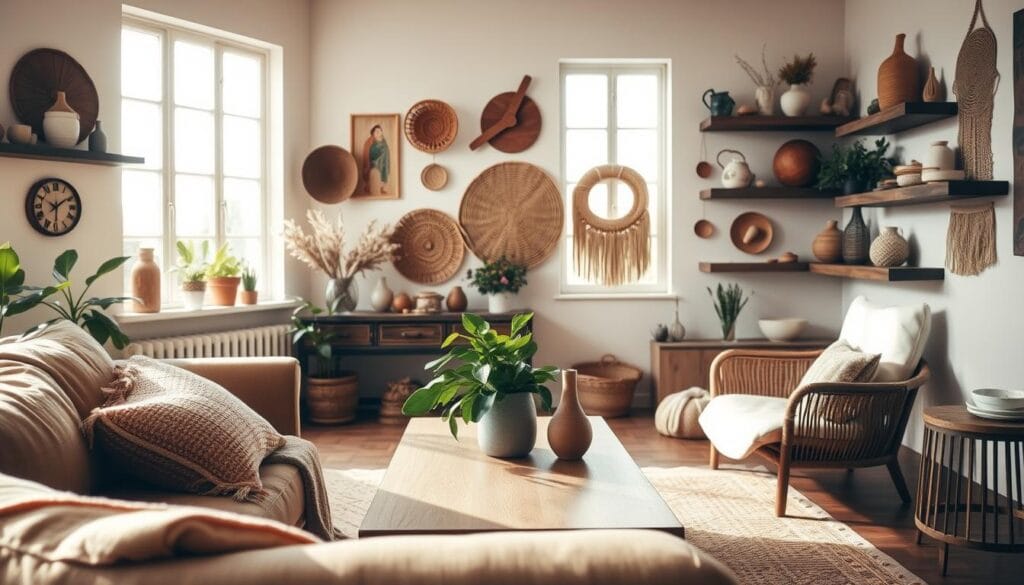
Choosing Organic Fabrics and Reclaimed Wood
Organic fabrics, like cotton, are a great choice for your home. They’re free from harmful chemicals, making them safer for your family and the planet. Plus, they improve indoor air quality, creating a healthier living environment. For example, organic cotton uses 71% less water than conventional cotton, making it a smart, eco-conscious option.
Reclaimed wood adds character and history to your space. Each piece is unique, with its own story to tell. Using reclaimed materials reduces waste and promotes resource reuse, which is a win for the environment. Whether it’s a rustic table or a statement wall, reclaimed wood brings warmth and texture to any room.
Here are some practical tips for sourcing these materials:
- Look for local artisans or stores that specialize in sustainable products.
- Check online marketplaces for reclaimed wood furniture and organic textiles.
- Visit sustainable home design resources for more inspiration.
These materials not only look great but also stand the test of time. Their durability means fewer replacements, saving you money and reducing waste. As one expert puts it,
“Choosing natural materials is a way to create a home that’s good for you and the planet.”
Ready to get started? Experiment with DIY projects like reupholstering a chair with organic fabric or building a shelf from reclaimed wood. These small changes can make a big difference in your home and the world around you.
Transforming Spaces with Eco-Friendly Design Tips
Small changes in your home can lead to big impacts on both style and sustainability. Whether you’re repurposing old furniture or upgrading your lighting, these tips will help you create a space that’s both beautiful and mindful of the environment.
DIY Projects for a Personalized Touch
One of the best ways to add character to your home is through DIY projects. Repurposing old furniture, like turning a wooden ladder into a bookshelf, gives new life to unused items. It’s a creative way to reduce waste and make your space uniquely yours.
Here are a few simple ideas to get started:
- Transform mason jars into stylish plant holders.
- Use reclaimed wood to create a rustic wall shelf.
- Upcycle old fabrics into decorative throw pillows.
These projects not only save money but also reduce your environmental footprint. As one DIY enthusiast shared,
“There’s nothing more satisfying than creating something beautiful with your own hands.”
Energy-Efficient Lighting and Decor Solutions
Lighting plays a huge role in setting the mood of a room. Switching to LED bulbs can save up to $225 in energy costs over their lifetime. Solar-powered lights are another great option for outdoor spaces, reducing energy use while adding a warm glow.
Here’s a quick comparison of energy-efficient lighting options:
| Option | Benefit |
|---|---|
| LED Bulbs | Use 75% less energy, last 25x longer |
| Solar Lights | Renewable energy source, cost-effective |
| Smart Bulbs | Programmable, reduce energy use by 30% |
By making these small changes, you can create a home that’s both stylish and energy-efficient. It’s a simple way to make a positive impact on your space and the planet.
Curating a Sustainable Home Decor Collection
Crafting a home that feels both modern and timeless is easier than you think. By blending contemporary trends with classic elements, you can create a space that’s uniquely yours. Let’s explore how to curate a personalized collection that reflects your style while staying mindful of the environment.
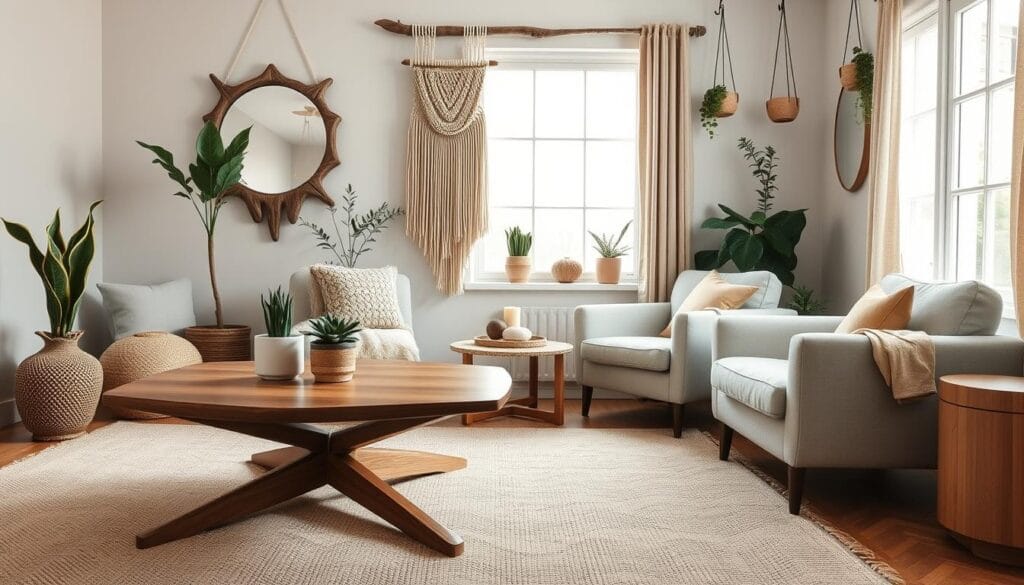
Mixing Modern Design with Timeless Traditions
One of the best ways to achieve balance in your home is by mixing modern and traditional pieces. Sleek, minimalist furniture pairs beautifully with handcrafted items like woven rugs or carved wooden tables. This combination adds depth and character to any room.
For example, a modern sofa can be complemented with vintage throw pillows made from organic cotton. Or, a reclaimed wood coffee table can anchor a contemporary living area. These pairings create a harmonious blend of old and new.
Thoughtful Selection for Lasting Impact
When curating your collection, focus on quality over quantity. Choose pieces that are not only beautiful but also durable. This reduces waste and ensures your decor stands the test of time.
Here’s a quick guide to help you make thoughtful choices:
| Item | Why It Works |
|---|---|
| Reclaimed Wood Furniture | Adds warmth and history to modern spaces. |
| Organic Cotton Textiles | Soft, natural, and eco-friendly. |
| Handcrafted Accessories | Unique and supports artisans. |
As one designer puts it,
“A well-curated home tells a story. Each piece should have meaning and purpose.”
By thoughtfully selecting your decor, you’re creating a space that’s not only stylish but also sustainable. It’s a way to make your home truly your own while making a positive impact.
Conclusion
Every choice you make for your home can shape a better future. By selecting thoughtful materials and practices, you create a space that’s not only beautiful but also kind to the planet. From energy-efficient lighting to natural textiles, each decision adds up to a positive impact.
We’ve explored how small changes can lead to big results. Whether it’s repurposing furniture or supporting ethical brands, your choices matter. These steps help reduce waste, improve air quality, and support healthier living environments.
Ready to take the next step? Start by applying the tips and ideas from this article. For more inspiration, check out this guide on eco-friendly interior design. Remember, even the smallest changes can make a difference. Your home can be a reflection of your values—stylish, functional, and mindful of the world around you.

